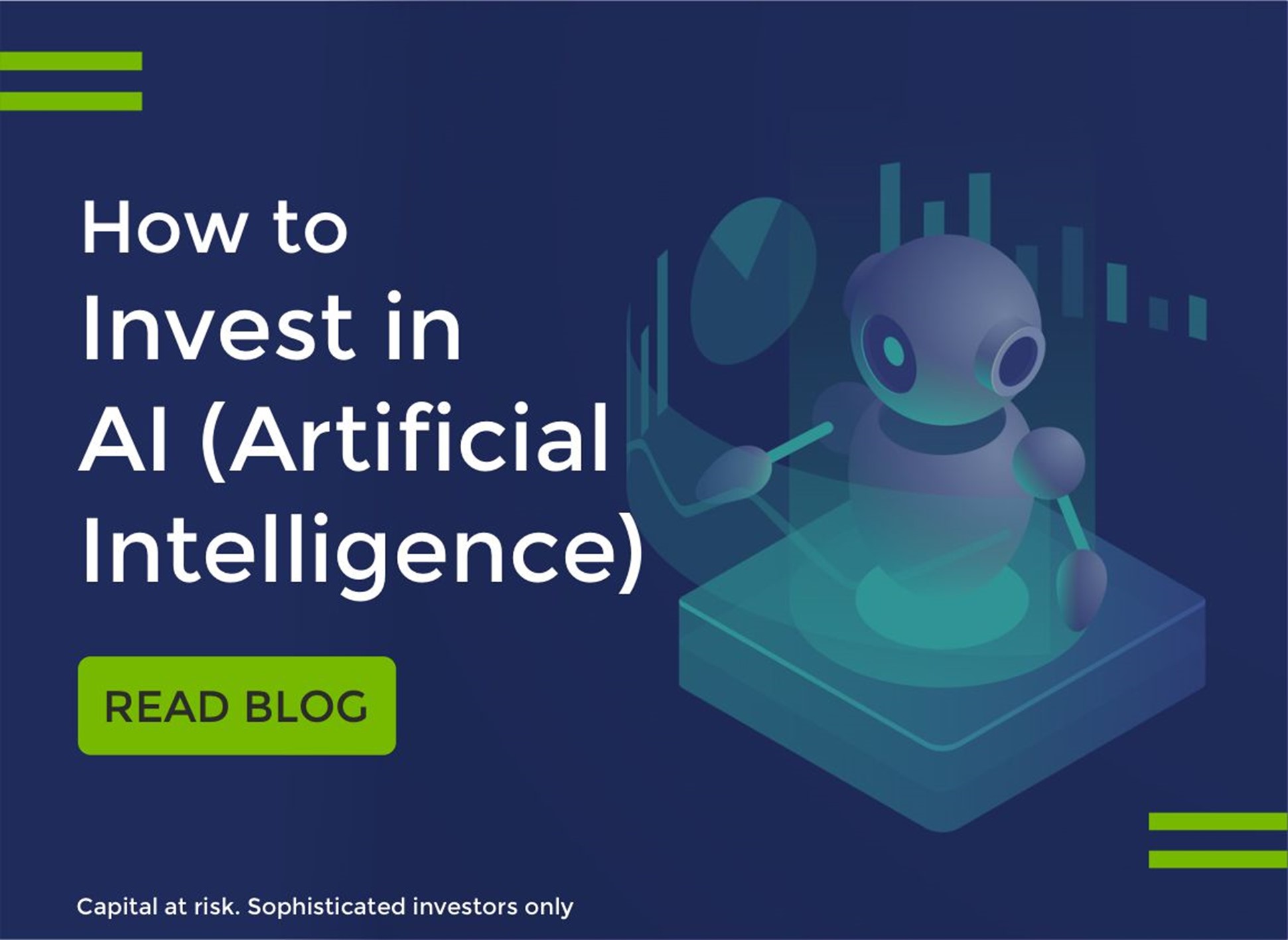How to Invest in AI
Posted:
Artificial intelligence (AI) has burst onto the scene, transforming the day-to-day operations of different industries, which include everything from healthcare to finance and more. This has created new avenues for growth and innovation.
Financial markets have responded to this innovating sector as well. Several companies are taking charge in the ever-emerging world of AI technologies, and an increasing number of businesses are adopting AI practices to leverage and improve their operational efficiency.
At the end of the day, investing in AI comes down to buying stocks or funds that involve companies that specialize in these AI technologies to foster future growth.
Understanding AI and its Applications
Artificial intelligence is a broad term that covers several different categories. Simply put, AI revolves around creating systems to perform tasks that previously required human intelligence. This includes learning, reasoning, problem-solving, interacting, and understanding natural language.
That’s a comprehensive overview, as several types of AI technology are layered within that. Some of these types include:
- Narrow AI: This is where AI is trained to perform a specific task. Think of virtual assistants like Siri or voice recognition software.
- Machine Learning: This popular technology has grown in recent years. Machine learning uses algorithms and other programs to analyze data, draw key insights, and make predictions or inferences.
- Neural Networks: These contain algorithms modeled after the human brain to recognize patterns and classify data.
- General AI: This is more of a theoretical principle, as general AI, in its purest form, could understand and perform nearly any task that human beings can do.
As an investor, it’s essential to understand the type of AI technology a company is working on and the potential use cases (or market viability) for growth, potential, and overall innovation.
Investment Opportunities in AI
When investing in any specific sector, assessing the market and identifying top-performing companies driving the space is crucial. On top of that, taking a deeper dive into some emerging contenders (potentially undervalued) makes sense while considering the risks associated with each.
Key Performers in AI Space
There are several key performers leading the way in the artificial intelligence sector. Investors should acknowledge that these markets are constantly evolving, so further analysis with up-to-date information is crucial before making any investing decisions. There are various companies investing heavily in the AI space which includes Microsoft, Nvidia, Alphabet,AMD, and Tesla are some of them.
Some of the key performers in the AI space include:
- Nvidia (NVDA): Has become a company leader in AI computing, as they are known for their graphics processing units (GPUs) and prospective “AI chips”.
- Alphabet (GOOGL): This is the parent company of Google, which has invested heavily in AI for search optimization, cloud computing, and other ventures.
- Microsoft (MSFT): Another key player in the AI service and tools race with the ability to integrate into existing solutions.
Strategies for Investing in AI
There are several strategies to consider when investing in AI. It’s important for prospective investors to develop a plan and accurately pin down their preferences before buying. Factors like experience, portfolio diversification, preferred holding length, and risk tolerance will help shape your overall strategy.
Long-Term vs. Short-Term Investments
Long-term strategies involve buying and holding stock tied to developing AI technologies for years. Meanwhile, short-term investments revolve around targeting these investments to take advantage of a quick market fluctuation to profit in a couple of days, weeks, or even a month.
Leveraged Single Stock ETFs
When adopting short-term investment strategies, experienced investors sometimes utilize leveraged single-stock ETFs. This can give you heightened exposure to a single stock to take advantage of a quick market swing.
Here are some examples of leveraged single-stock ETFs that play a role in the artificial intelligence sector also called AI ETFs
Both of these leveraged ETFs track the daily performance of the underlying stock and multiply it by two. For example, when Micorosft’s stock rises by 2% in a day, the 2x leveraged ETF (MSFL) sees a rise of 4%. While these funds can amplify returns, they can also extend losses. Using that same example, if Microsoft experiences a 1.5% loss in a day, then MSFL is down 3%.
Balancing Risk and Return
It’s important to balance the potential return with overall risk tolerance and diversification when investing in leveraged ETFs or any other asset in the artificial intelligence sector. Understanding the importance of position size and how an investment meshes with the overall portfolio is paramount.
Leveraged ETFs are usually purchased by experienced investors with medium-to-high risk tolerance based on extensive research and a well-defined strategy.
Regardless of purchasing a single stock or leveraged ETF, investors need to consider the inherent volatility alongside the potential return of these investments. Artificial intelligence is a fast-moving industry with many ups and downs, so it’s vital to monitor positions.
How to Buy AI Stocks
When looking to buy AI stocks, the first order of business is to open an investment account. This can often be completed fairly quickly online within minutes. The next step is to fund the brokerage account to purchase stocks.
Let’s break down the entire process below:
- Open an investment account. Subsequently, fund the account.
- Research and identify AI investment opportunities. Perform your due diligence. Understand what the company does, the price history and potential, and check any relevant ratings and reports.
- Craft an investment strategy. How long do you plan on holding the stocks? Do you have specific price goals for entry, losses, and profits?
- Buy the stock and monitor performance. Purchase the stock and review your positions regularly while adapting to any market changes as necessary.
Sometimes, it’s helpful to set up price alerts concerning the stocks in a portfolio or watchlist. On top of that, it’s important to stay informed when it comes to news in the AI sector and the broader financial markets.
Analyzing AI Sector Trends
Investing in AI requires a good understanding of the current trends and future predictions within the sector. Staying ahead of these trends can provide an edge in identifying potential growth areas and lucrative investments.
Current Trends in AI
AI as a Service (AIaaS): AIaaS is gaining traction as companies prefer to outsource their AI needs to specialized providers. This includes cloud-based platforms that offer AI tools and services on a subscription basis.
AI in Healthcare: AI is revolutionizing healthcare with applications in diagnostics, personalized medicine, and drug discovery. Companies specializing in these areas are worth keeping an eye on.
Autonomous Vehicles: The race for self-driving cars continues, with significant investments from tech giants and automotive companies. AI plays a crucial role in developing the software and hardware for these vehicles.
Natural Language Processing (NLP): NLP technology is advancing rapidly, enabling machines to understand and generate human language. This has vast applications in virtual assistants, customer service bots, and more.
Future Predictions
AI Integration: AI will become even more integrated into everyday devices and systems, making technology smarter and more intuitive.
AI Ethics and Regulation: As AI becomes more pervasive, ethical considerations and regulatory frameworks will shape its development and implementation. Companies that prioritize ethical AI practices may gain a competitive edge.
AI and Employment: The impact of AI on jobs is a topic of ongoing debate. While AI will automate certain tasks, it will also create new job opportunities in AI development, maintenance, and supervision.
Diversifying Your AI Investments
Diversification is a key strategy to manage risk and maximize returns. Instead of putting all your funds into a single AI company, consider spreading your investments across different sectors and types of AI applications.
AI ETFs and Mutual Funds
AI-focused Exchange-Traded Funds (ETFs) and mutual funds provide a way to invest in a basket of AI-related companies. This approach offers diversification and reduces the risk associated with investing in a single stock.
Startups and Emerging Companies
Investing in startups and emerging companies can offer high growth potential, although it comes with higher risk. Look for companies with innovative technologies, strong leadership, and a clear path to profitability.
Evaluating AI Companies
Before investing, it's essential to conduct thorough research on potential AI companies. Here are some key factors to consider:
Financial Health
Review the company's financial statements, including revenue growth, profit margins, and debt levels. A strong financial position indicates the company's ability to invest in AI research and development.
Innovation and R&D
Assess the company's commitment to innovation and R&D. Companies that invest heavily in AI research are more likely to develop cutting-edge technologies and maintain a competitive edge.
Market Position
Consider the company's market position and competitive landscape. Leading companies with a strong market share and a diverse portfolio of AI products and services are often more stable investments.
Risks and Challenges in AI Investing
Investing in AI is not without its risks and challenges. Understanding these can help you make informed decisions and manage your investment portfolio effectively.
Technological Challenges
AI technology is still evolving, and there are significant challenges in areas like data privacy, algorithm bias, and computational power. Companies that can navigate these challenges successfully are more likely to thrive.
Market Volatility
The AI sector is highly dynamic, with rapid changes and innovations. This can lead to significant market volatility. It's essential to stay informed and be prepared for market fluctuations.
Regulatory Risks
As AI becomes more widespread, it will attract greater regulatory scrutiny. Changes in regulations and compliance requirements can impact the profitability and operations of AI companies.
Conclusion
AI has plenty of potential in today’s market, influencing several industries and driving innovation.
However, it’s important to take careful consideration before entering any position related to AI – or any other sector for that matter.
The best way to start is to research company performance and pricing trends while developing a risk/reward investment strategy.
Overall, AI presents opportunities, but informed decisions are crucial.
ETFs by GraniteShares
| Product name | Ticker |
|---|---|
|
US |
|
Fund Risk
This website and its content has been provided by GraniteShares.
Investors should consider the investment objectives, risks, charges and expenses carefully before investing. For a prospectus or summary prospectus with this and other information about the Funds, please call (844) 476 8747 or by visting GraniteShares ETFs. Read the prospectus or summary prospectus carefully before investing.
Investing involves risk including the possible loss of principal. There can be no assurance that the investment objective of the Funds will be achieved. None of the Funds should be relied upon as a complete investment program. The investment program of the funds may entail substantial risks.
Exchange-Traded Funds (ETFs) shares trade at market prices rather than at net asset value (NAV), shares may trade at a price greater than NAV (premium) or less than NAV (discount). Shares may be bought and sold throughout the day on the exchange through any brokerage account. Buying and selling shares of ETFs will result in brokerage commissions.
The ETF Funds are distributed by ALPS Distributors, Inc. GraniteShares is not affiliated with ALPS.
ALPS Distributors, Inc, provides marketing services to the Exchange-Traded Grantor Trusts. The Sponsor of the Trust is GraniteShares LLC.
©2024 GraniteShares Inc. All rights reserved. GraniteShares, GraniteShares ETFs, and the GraniteShares logo are registered and unregistered trademarks of GraniteShares Inc., in the United States and elsewhere. All other marks are the property of their respective owners.


